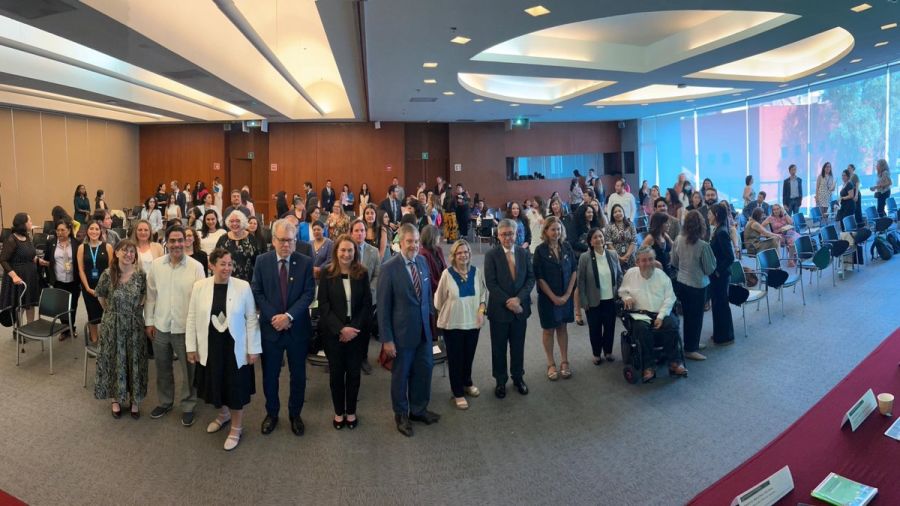
Moving towards a care society requires recognizing and valuing care work
Care specialists and decision-makers participated in the event "Moving towards a care society". It was an opportunity to deepen debates, address public policy and institutional challenges and exchange experiences on care systems.
The Foreign Ministry, National Institute for Women (Inmujeres), Inter-American Conference on Social Security (CISS), Global Alliance for Care, and the International Cooperation Roundtable for Gender Equality in Mexico (MCIG) held a forum on “Moving Towards a Care Society.”, on May 7. The forum was chaired by the Chilean and German embassies in Mexico and UN Women.
The forum was an important opportunity to advance the debate on care, address the challenges to public policy and institutions, exchange experiences on care systems at the international, national and local levels, care networks. Significant inequalities exist around the world in the distribution of care work. According to data from the 2022 National Survey for the Care System (ENASIC), in Mexico, women spend about 37.9 hours per week on care work, while men spend only 25.6 hours, a gap of more than 12 hours.
In the forum’s opening segment, Foreign Secretary Alicia Bárcena gave a video message, saying that care is essential in society and human life in its three dimensions: giving care, receiving care, and self-care, and that efforts should be combined to ensure the right to care. The Foreign Secretary said that, in light of its feminist foreign policy, Mexico promoted the adoption of three resolutions in the the General Assembly, the Human Rights Council and the UN Commission for Social Development. The inauguration was also attended by the Undersecretary for Multilateral Affairs and Human Rights at the Foreign Ministry, Joel Hernández García; Inmujeres President Nadine Gasman Zylbermann; the representative of UN Women, a. i., Moni Pizani Orsini; the Chilean Ambassador to Mexico, Beatriz Sánchez Muñoz; the German Ambassador to Mexico, Wolfgang Dold; the UN Resident Coordinator in Mexico, Peter Grohmann; the Director of ECLAC's Gender Division, Ana Güezmes García; and the Technical Secretary of the Global Alliance for Care, Ana Moreno.
Patricia Cossani Padilla, an expert in care and social protection policies, gave a keynote speech on "The right to care: Recognition and progress in Latin America," which was the basis for the discussion held at six thematic roundtables that addressed issues such as recognition, reduction and redistribution of care work; remuneration for care workers; intersectionality; investment in care; the legal framework and public policies; and cultural changes for more equitable caregiving. The roundtables were held in conjunction with federal and local institutions, the private sector, civil society organizations, paid and unpaid caregivers, trade unions, and international organizations.
There were two plenary sessions. The first focused on the challenges from the perspective of caregivers and domestic workers, with the participation of Cintya Noema Uzeta Sánchez, a member of Yo Cuido México and Apapache Autismo CDMX; María de la Luz Padua Orihuela, from the National Union of Domestic Workers (Sinactraho); Marcelina Bautista, from the National Center for Domestic Worker Training (Caceh); Maria Guadalupe Castro Zaragoza, collaborator of Findedis and member of the UN Women Civil Society Advisory Group; Margarita Garfias, Founder of Familias y Retos Extraordinarios and #YoCuido México, and Paulina Urrutia, protagonist of the documentary "La Memoria Infinita."
The second session addressed international and local best practices on care systems. Participants included the Secretary for Substantive Equality between Women and Men of Jalisco, Paola Lazo; the President of the San Pedro Garza García DIF in Nuevo León, Irene Ovalle Araiza; the Director General of Equality and Gender Violence of the CDMX Women's Ministry, Dulce Colín Colín; and the Head of the Division of Social Promotion and Protection of the Ministry of Social Development and Family of Chile, Romy Alejandra Alamo Pichara.
In a third segment, Ana Güezmes of ECLAC presented the Buenos Aires Commitment, the result of the XV Regional Conference on Women in Latin America and the Caribbean in 2022. Inmujeres President Nadine Gasman announced that Mexico will host the next Regional Conference on Women in 2025. The Director General for Human Rights and Democracy at the Foreign Ministry, Roberto de León, underscored the importance of these regional advances and their relationship with the achievements of multilateral forums such as the UN General Assembly and Human Rights Council.
The event concluded with a plenary session to present the conclusions of the roundtable discussions moderated by Moni Pizani, UN Women representative in Mexico.
Lastly, there were remarks by the technical secretary of the Global Alliance for Care, Ana Moreno; the Chilean ambassador to Mexico, Beatriz Sanchez; and the German ambassador to Mexico, Wolfgang Dold.
The results of the meeting will be included in a report designed to strengthen national care policies and contribute to upcoming international meetings, such as the Third Ministerial Conference on Feminist Foreign Policies and the XVI Regional Conference on Women in Latin America and the Caribbean, which will take place in Mexico in 2024 and 2025, respectively.
This forum event represents a big step toward a more just and egalitarian society, where care is recognized as a fundamental human right that must be placed at the center of public policies and the international agenda.


